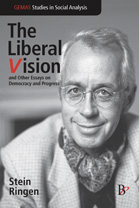
|
The Liberal Vision
and Other Essays on Democracy and Progress
By Stein Ringen
Gemas
Studies in Social Analysis
Series Editors: Mohamed Cherkaoui, Peter Hamilton
& Bryan S. Turner
November 2007, hardback, 224 pp.
ISBN-13: 978-1-905622-04-7
NO LONGER AVAILABLE
These reflections are about modern capitalism. It is a waste of
time to be for or against globalisation. New technology is a fact,
the mobility of capital is a fact, the movement of jobs and people
across borders is a fact. The political challenge is to master the
use of reason in a world economy that is now unbelievably
productive in the generation of wealth but also shockingly unfair
in the distribution of economic power.
The liberal theory of freedom comes from another age when people
mostly lived wretchedly and were oppressed and poor. We who live
at the top of the new world must revise that theory. If we are to
live as our own masters we must cultivate the skill of
self-control in how we live together.
Solidarity is surprisingly elusive when the conditions are at
their best. We think that the more wealth we have, the greater
will be our solidarity, but this is not the case. On the world
scene there is giving but no welfare state. Public policy is
informed by the need to contain poverty but with limited vision
about how to eradicate it.
Democracy rests on an idea of equality, that everyone counts the
same. But capitalism breeds inequality. The transgression of
economic power into the domain of democratic politics has become
so great that the people’s democracy is being destroyed
before our very eyes.
Stein Ringen’s book is the product of a battle to restore
the importance of simplicity, of realism and of good sense in
the study of democracy [and] outlines many topics that I believe
are essential to the analysis and direction of political
life.
— From the foreword by Raymond Boudon, Académie des
Sciences Morales et Politiques, Paris
Contents:
FOREWORD: What Makes Democracy Good
INTRODUCTION
PART I: Reason
CHAPTER I.1: The Liberal Vision
CHAPTER I.2: Liberty--Isaiah Berlin
CHAPTER I.3: Rationality--Raymond Boudon
CHAPTER I.4: The Enigma of Freedom
PART II: Solidarity
CHAPTER II.1: The Population Crisis
CHAPTER II.2: Pension Reform
CHAPTER II.3: The European Social Model
CHAPTER II.4: Social Policy and Development
CHAPTER II.5: The Eradication of Poverty
CHAPTER II.6: A Note on Giving
CHAPTER II.7: How Unequal Are We?
PART III: Democracy
CHAPTER III.1: The Legacy--Robert A. Dahl
CHAPTER III.2: How to Define Democracy
CHAPTER III.3: How to Make Children Citizens
CHAPTER III.4: How to be Democratic in Europe
CHAPTER III.5: How Good a Democracy is America?
CHAPTER III.6: How to Repair Democracy in Britain
CHAPTER III.7: How to Pay for Politics
A POSTSCRIPT
BIBLIOGRAPHY
INDEX
|

